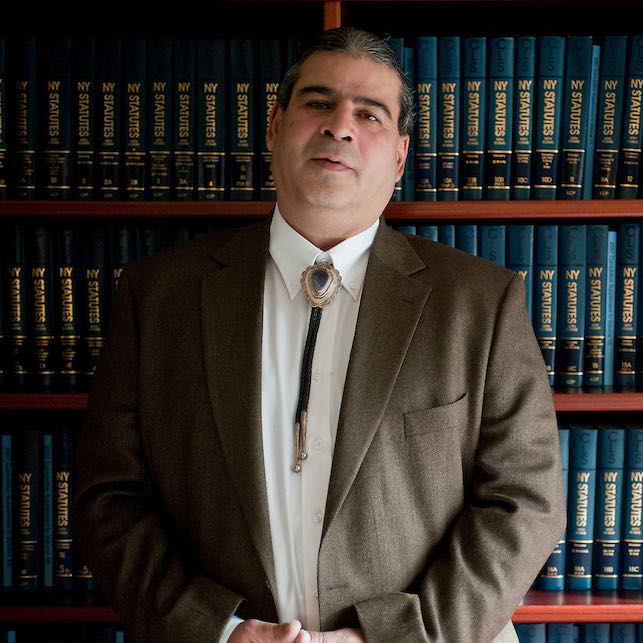
- Details
- By Chief Harry Wallace
Guest Opinion. A coalition of American Indian Nation members of the National Congress of American Indians (NCAI) has risen in opposition to a proposal that would remove membership for Native nations who are not on a federal list of tribes who receive funding from the Bureau of Indian Affairs (BIA). The proposal would exclude at least 24 bona fide Native nations that are currently members of the NCAI, by downgrading their status to "association.”
Those nations would no longer be allowed to cast votes in the NCAI, and their citizens would likewise be disenfranchised. Those nations are recognized by various states but, due to colonial and federal termination efforts, are not listed to receive direct benefits from the BIA, even though they may have governmental relationships with other federal agencies.
NCAI is poised to further the erasure of Native ations-to finish the white man's work. The proposal flies in the face of NCAI's origin, which was to vigorously defend against any efforts to terminate the First Peoples of this country.
A coalition of Native nations recognized by federal and state governments oppose the proposal because it would distort the mission of NCAI by diminishing inter- Tribal empowerment and diluting Indigenous representation. The proposal itself depends on a misrepresentation of history that replaces Indigenous values with artificial colonized distinctions.
The 24 bona fide Native nations most immediately affected by the proposal are those NCAI members, who, as original peoples, enjoy either common law sovereignty or are recognized as Native nations by the states where they reside or by the other tribes in their region. Many have been a part of NCAI for decades as voting members and have helped the Congress build a reputation for representing the disparate interests of its membership and speaking in the collective voice of American Indigenous peoples.
NCAI has long understood that federal status was subject to changing federal policy, and sought to protect the inherent sovereignty of all Native Nations from destructive federal policies and malign neglect. In 1944, NCAI was formed to withstand federal efforts to terminate Native nations. According to Thomas W. Cowger's book, The National Congress of American Indians: The Founding Years, NCAI originally "stressed both civil and tribal rights by declaring that the common welfare of Native Americans required the preservation of cultural values [and] the defense of legal rights."
By the 1970s, NCAI formed an Executive Council on recognition to assist terminated Native nations in achieving federal recognition. In 1978, the NCAI convened its historic National Conference on Tribal Recognition, unanimously adopting a Declaration of twelve principles, proclaiming that "as an organization that represents the common interest of all tribes," NCAI demands that the United States "fulfill its obligation to all tribes... and acknowledge the existence" of non-federally recognized Native nations. Those efforts continue today through NCAI's Federal Recognition Task Force.
The proposal undermines the very reason NCAI was formed 80 years ago, as well as the 1978 Declaration of the NCAI. For NCAI to succumb to this dishonorable mission would bring shame to our future generations and mark a sorrowful beginning to a new chapter for the Indian Congress one of neocolonialism and self-termination.
Harry B. Wallace served as chief of the Unkechaug Indian Nation, a New York state recognized tribe, for 25 years. Since 2016, Wallace has taught courses at Stony Brook University as part of the linguistics departments’ Algonquian Language Revitalization Project, which he cofounded.
Help us defend tribal sovereignty.
At Native News Online, our mission is rooted in telling the stories that strengthen sovereignty and uplift Indigenous voices — not just at year’s end, but every single day.
Because of your generosity last year, we were able to keep our reporters on the ground in tribal communities, at national gatherings and in the halls of Congress — covering the issues that matter most to Indian Country: sovereignty, culture, education, health and economic opportunity.
That support sustained us through a tough year in 2025. Now, as we look to the year ahead, we need your help right now to ensure warrior journalism remains strong — reporting that defends tribal sovereignty, amplifies Native truth, and holds power accountable.
 The stakes couldn't be higher. Your support keeps Native voices heard, Native stories told and Native sovereignty defended.
The stakes couldn't be higher. Your support keeps Native voices heard, Native stories told and Native sovereignty defended.
Stand with Warrior Journalism today.
Levi Rickert (Potawatomi), Editor & Publisher
